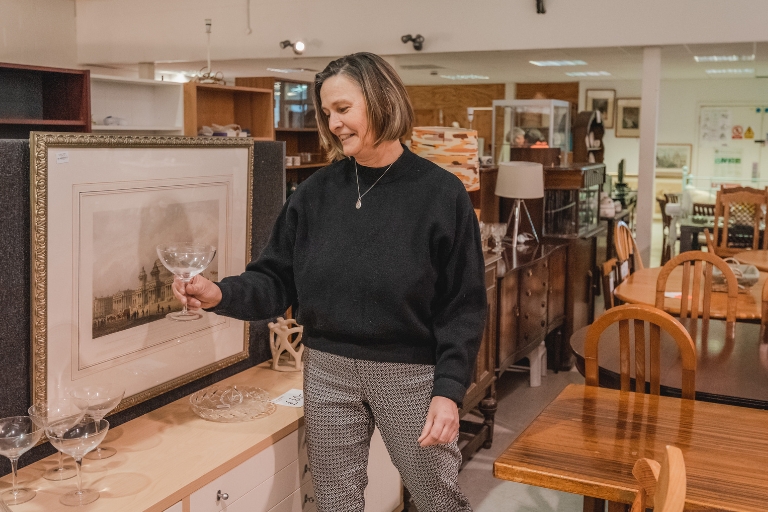Black History Month 2022
This month marks Black History Month and as an organisation we felt it was important to mark it, to reflect on what we have done, and how much more we still need to do, to become a richly diverse place to work.
The theme for this year’s Black History Month is ‘Time for Change: Action Not Words’.
We know we still have a long way to go at St Catherine’s and we know that having an EDI group doesn’t mean things will magically change overnight. But not marking Black History Month suggests that it’s not relevant to us. But it is. It’s relevant to each and every one of us in making positive change.
Black History Month is also a chance for us to recognise the too-often neglected contributions that black people have made, and continue to make, to the UK every day – past, present or future.
We wanted to put a spotlight on Daphne Steele, the first black matron in the NHS, and the incredible contribution that she made to nursing care.
Daphne Steele
Picture reproduced from Balham Newsie
Born in British Guyana, Daphne dedicated her life to nursing after she emigrated to the UK in 1951.
She started her nursing career in the UK at St. James’ Hospital in Balham and worked at RAF Brize Norton in Oxfordshire before becoming deputy matron in a Manchester nursing home.
When the nursing home was facing closure, Daphne considered her next move.
Recognising her ambition, the matron in charge of the nursing home encouraged Daphne to go for the position of matron at a hospital in West Yorkshire. The encouragement worked and in 1964, Daphne made history by becoming the first black matron in Britain at St. Winifred’s Hospital in Ilkley.
News of Daphne’s appointment spread as far afield as the United States and her native Guyana.
When St. Winifred’s closed in 1971, Daphne trained as a health visitor at Leeds University. She took on her role with vigour and quickly became an integral part of the community.
Her sister, Jeune, recalled a time when she went to visit Daphne. One day, they set off to go shopping. However, so many people stopped to ask Daphne for advice that they barely made it to the shops, such was Daphne’s devotion to the people in her care. In fact, it was due to Daphne’s passion for nursing that Jeune herself entered the profession.
When she died in 2004 her sister said: “Daphne loved being a nurse and would bend over backwards to help. She never seemed to be off duty. There was always a willingness to do something, to advise, to ask questions. She was definitely a people person. You could say she was the ideal nurse!”.
Daphne’s courage and determination to become the first black matron has helped to lead the way and shape the future aspirations for black nurses ever since. Her trailblazing story is just one example of the incredible achievements made by thousands of black nurses and healthcare professionals who have each played their own role in helping to progress nursing for the better, ever since.
Take action yourself
Why not take a small action yourself and listen to a relevant podcast to mark Black History Month, read a book or watch a film to highlight the incredible stories and achievements of black individuals and communities in the past? See the list below for some ideas!
So let’s all use ‘Action Not Words’ to challenge the norms, listen to lived experiences and empower those around us. With positive action, new black history can be made every day.
Resources: Podcasts, books and films
Podcasts:
- Black History Bites: A weekly 10 minute history podcast about global Black history to help your Black history learning.
- Black History Moments – Stories of those forgotten in Black history
- Slay in Your Lane – Topical news and popular culture from a Black British female perspective
- Code Switch – Fearless conversations about race
Books:
- Why I’m no longer talking to white people about race: Award-winning journalist Reni Eddo-Lodge wrote about her frustration with the way that discussions of race and racism in Britain were being led by those who weren’t affected by it. She posted a blog, entitled: ‘Why I’m No Longer Talking to White People About Race’ that led to this book.
- Black and British: Historian and broadcaster David Olusoga tells the revealing story of the long relationship between the British Isles and the people of Africa and the Caribbean.
- The Vanishing Half: Brit Bennett’s second novel about the differing fates of twin sisters, after one decides to pass for white.
- Twenty-Eight Pounds Ten Shillings – A Windrush Story: Tony Fairweather’s debut novel about the history of young Caribbean people who responded to the call from the British Empire for men and women to help rebuild the “Mother Country” after the Second World War.
Films:
- Malcolm X: The classic epic biopic of the late controversial Civil Rights leader Malcom X.
- Marshall: The biopic covering one of Thurgood Marshall’s early high profile cases as two lawyers team up to fight racism and prejudice.
- Hidden Figures: The story of the brilliant minds of three black women at NASA: Katherine Johnson, Dorothy Vaughan, and Mary Jackson.
- Green Book: Set in America in 1962, Green Book tells the heart-warming true story of Tony Lip, a working-class Italian-American bouncer who takes on a job as a chauffeur for Dr Don Shirley a world-class Black pianist as they tour concert venues in the racially charged Deep South.














